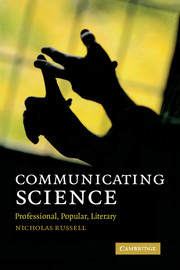Book contents
- Frontmatter
- Contents
- Introduction: What this book is about and why you might want to read it
- Prologue: Three orphans share a common paternity: professional science communication, popular journalism and literary fiction are not as separate as they seem
- Part I Professional science communication
- Part II Science for the public: what science do people need and how might they get it?
- 6 The public understanding of science (PUS) movement and its problems
- 7 Public engagement with science and technology (PEST): good principle, difficult practice
- 8 Citizen scientists? Democratic input into science policy
- 9 Teaching and learning science in school: implications for popular science communication
- Part III Popular science communication: the press and broadcasting
- Part IV The origins of science in cultural context: five historic dramas
- Part V Science in literature
- Index
- References
9 - Teaching and learning science in school: implications for popular science communication
Published online by Cambridge University Press: 02 December 2010
- Frontmatter
- Contents
- Introduction: What this book is about and why you might want to read it
- Prologue: Three orphans share a common paternity: professional science communication, popular journalism and literary fiction are not as separate as they seem
- Part I Professional science communication
- Part II Science for the public: what science do people need and how might they get it?
- 6 The public understanding of science (PUS) movement and its problems
- 7 Public engagement with science and technology (PEST): good principle, difficult practice
- 8 Citizen scientists? Democratic input into science policy
- 9 Teaching and learning science in school: implications for popular science communication
- Part III Popular science communication: the press and broadcasting
- Part IV The origins of science in cultural context: five historic dramas
- Part V Science in literature
- Index
- References
Summary
“The trouble is”, said Andrew spinning on his chair and poking me with the end of his pencil, “you still think of energy as caloric, don't you?”
“Caloric?” I spluttered, puzzled and digging deep into the murky recesses of my knowledge of ancient chemical theories – phlogiston? No not phlogiston – caloric, desperate scramble to recall, “Isn't that some sort of stuff?”
“Yes, energy as stuff flowing like ethereal water. That's why you are confused about fuel and energy – it's all caloric to you!”
Properly trained chemist that he was, Andrew was right and here was I, a science curriculum developer, caught out in an embarrassing confusion about something central to the understanding of pretty well all science, I had been using an incorrect concept of energy for decades. But I had two lines of defence, one rather feeble, that I was a biologist and only ever learned enough chemistry to get by, and the other that endless educational research papers have shown that most students misunderstand most science most of the time, and too many of them never overcome the problem. I was clearly one of these unfortunates.
But I had got on quite well because, to the extent that I needed ‘energy’ in biology, a caloric concept did a serviceable job. Was I as confused and partial in my understanding of everything? As far as I could tell: no. With theoretical concepts central to the science I was supposed to understand, genetics and evolution theory, for instance, I hoped my grasp of fundamentals was stronger. […]
- Type
- Chapter
- Information
- Communicating ScienceProfessional, Popular, Literary, pp. 116 - 132Publisher: Cambridge University PressPrint publication year: 2009
References
- 1
- Cited by



